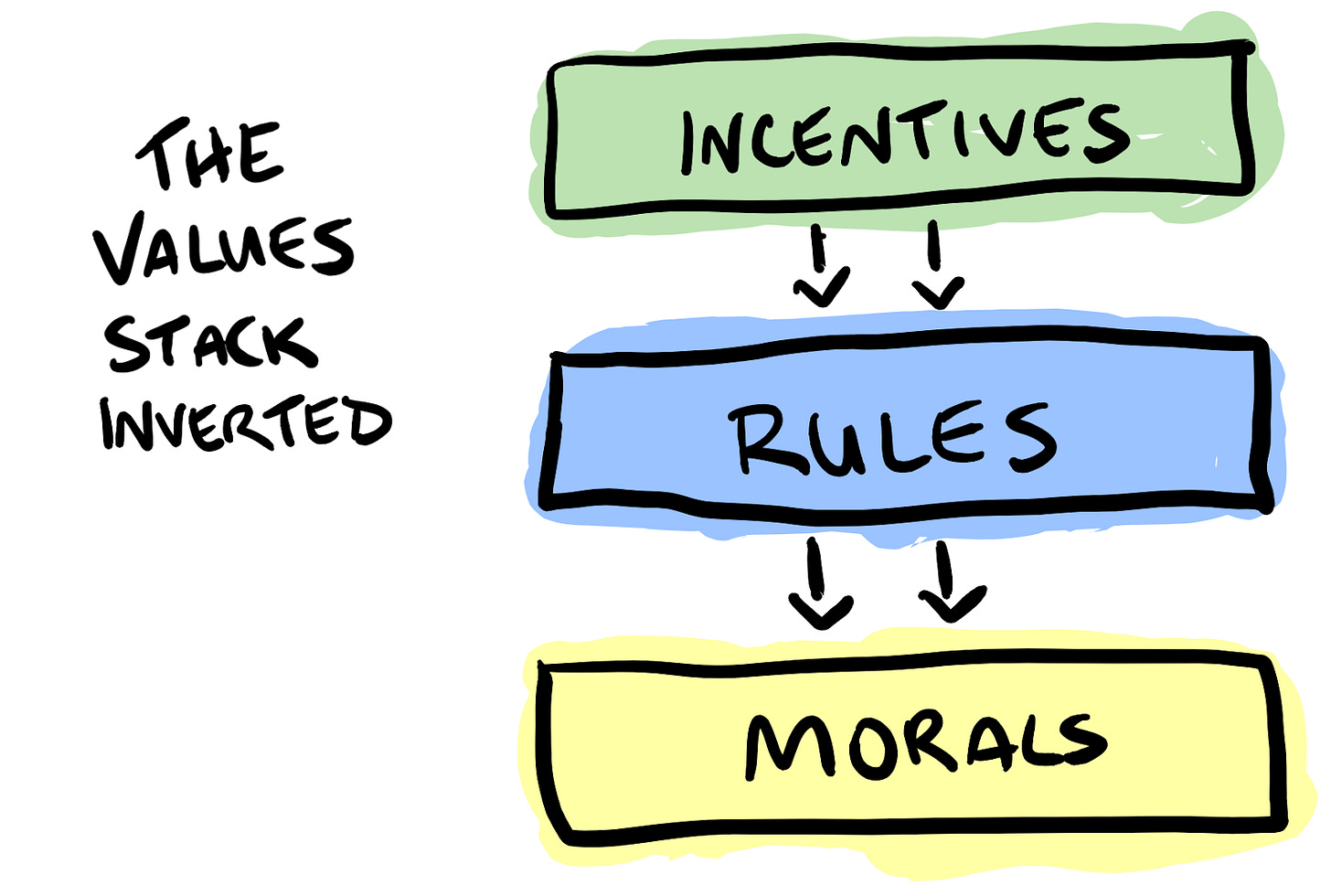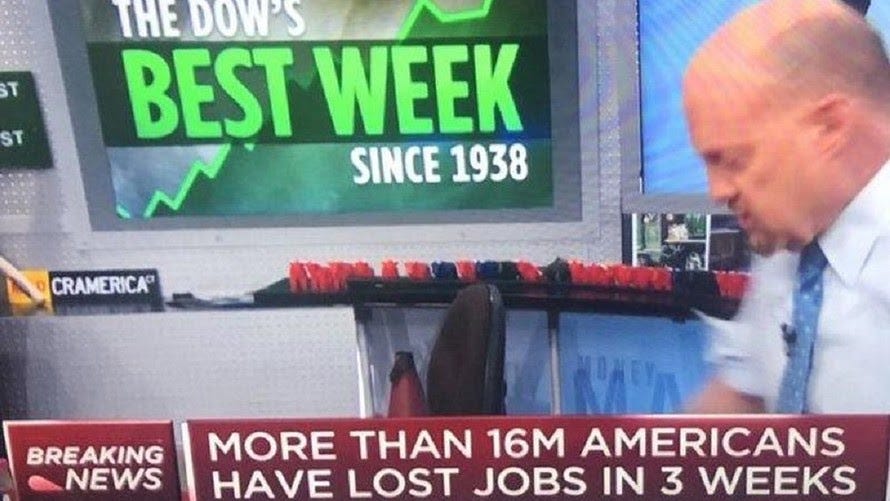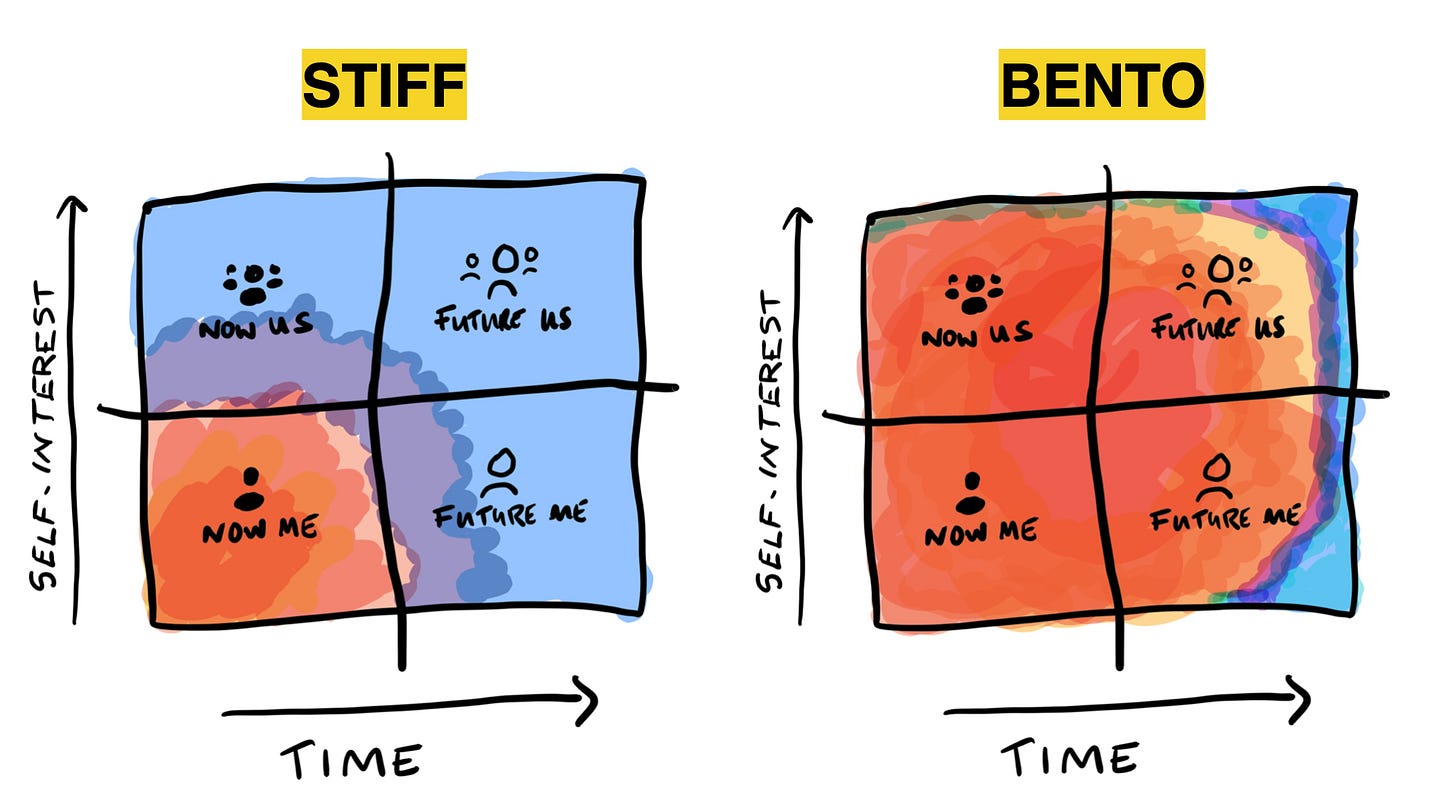The Values Stack
My book This Could Be Our Future ends with a sci-fi snapshot of the future.
It’s 2050 and a new movement “led by some of the best and brightest of the Millennial and Z generations” has begun to change how the world works. This group is called the Bento Society. They’re dedicated to transforming how the world approaches value.
Whereas the previous world (our present day) was dominated by the values of money, power, and a belief in short-term individualistic financial fundamentalism (or STIFF, as it became known), the new world sees self-interest differently. After a series of crises, the belief in the importance of shared values and the Us space grew considerably. And after scientists’s dire predictions proved correct, the desire for future planning became widespread.
The Bento Society’s theory — based on writings by Elizabeth Anderson, Donella Meadows, and others — was that if the right leverage points were pushed at the right times, the value system of society would transform. It wouldn’t happen immediately. It wouldn’t be one thing that did it. But bit by bit it was possible. The key question: where to start.
The Values Stack
Most technology applications run on what’s called a “tech stack.” This phrase describes how technologies build on each other’s functionality. Here’s a sketch of a website’s tech stack, for example:

Being “lower” in the stack means being core to how the system runs but farther from the end user. The visible is built on what’s less visible.
Imagine this same structure applied to values. The Values Stack has three layers, each built on the one before:
The Moral layer: Our personal and cultural beliefs of right and wrong
The Rules Layer: Expressions of beliefs through laws, rules, and norms
The Incentives Layer: What orients collective action around shared values and goals
Here it is visualized:

Each layer of the stack is the foundation for the next. A society’s cultural and moral beliefs shape their rules and norms. Those rules and norms shape the metrics and incentives that guide how the society defines success. This is how a value system replicates itself.
The Values Stack has flipped
In recent history this isn’t how things have worked, however. Because of a shift in power, the Values Stack has functioned in reverse.
Instead of morals driving rules and incentives, it’s been like this:

Money (an incentive) bought political influence that allowed it to rewrite the rules in its favor. Its power has overruled the moral layer, too, as we see in this image from last week:

Stocks are up while jobs are down because our Values Stack is tilting even more in favor of those in power. The inequality between our values and reality has never been greater.
Two ways to change the Values Stack
The Bento Society’s approach isn’t to curb-stomp the status quo or tear everything down. It’s to build on it. History suggests that change is like improv — it’s “yes and.” We “yes and” on what’s already here.
This is a topic we’ll return to again in future issues. Right now I want to name the two primary avenues of “yes and” change that the Bento Society is focused on.
#1 Redefining self-interest at the moral level
The Bento Society believes that people can be trusted to act according to their self-interest. But the Bento Society also believes that how we define self-interest is too narrow.
A shift in how we define “self” is as root-level as change can get. We can see how significant it would be by comparing the STIFF perspective (where we are now) to the BENTO perspective (where we need to be).

Under STIFF we’re stuck in Now Me unable to see anything other than near-term individual value. This limited perspective makes self-sacrifice unthinkable and addiction rational. It traps us in an incomplete version of ourselves.
As we become more actively aware with a Bentoist perspective, our perimeter of self-interest expands. Universes of values and concerns become newly relevant. Currently people experience this awakening through life experiences. But this is something that could easily become part of broader culture too.
The idea that people would shift how they view their self-interest would have seemed implausible until recently. Then COVID-19 happened. We’ve seen the degree to which our self-interest can change.
If we adopt Bentoist mindsets personally, how does that change things collectively?
#2 New metrics at the rules and incentive levels
We’re a world ruled by metrics: stock prices, poll numbers, demographics, calories. Their importance will only increase.
AI and other automated systems that increasingly run our lives function on the basis of metrics. They monitor them, optimize for them, maintain equilibrium states of them. Which metrics? Whatever the Values Stacks of the people making and financing those systems say they should be.
The biggest challenge of any human organization is to reach its intended targets (for lots of human reasons). AI-led systems will have few problems reaching the targets its programmers set out for it. The challenge of AI will be the values and factors its human programmers fail to account for.
I get the desire to keep humanist values out of machines. Trying to define or measure a moral value like “fairness” or “generosity” feels sacrilegious. Early attempts, like the SAT’s “adversity score,” have been met with scorn. But what if values are rendered effectively meaningless or extinct unless someone programs them into the system?
If we want our systems to support these values at the widest possible scale, we’ll need to mathematically define them. The most important metrics for shaping the future haven’t been created yet.
The new Values Stack
Our current paradigm — Short-Term Individualistic Financial Fundamentalism (STIFF) — is in crisis. Calls for a new Values Stack are loud and getting louder. They’re coming from the left and the right.
As we see beyond Now Me — as we are now with COVID-19 — the incentives that dominate today become less important. Values like stability, resilience, and community — representing the other spaces of the bento — are ascendant.
Here’s how the two Values Stacks look side by side:

How will we get there? How would we know if we were on our way?
Donella Meadows’s “Leverage Points: Places to Intervene in a System” includes this very relevant list that tells us where to start to have maximum impact:

The need for a new paradigm has never been more acute. Candidates are stepping up, from Universal Basic Income to the UN’s Sustainable Development Goals to Doughnut Economics to the bento. A concerted push to rebuild the Values Stack is growing.
In upcoming posts, we’ll dig into examples of the new Values Stack in action, the rise of past values that we now take for granted, and next steps for moving beyond the inflexibility of STIFF.
Many thanks to my Bentoism collaborator Rhys Lindmark for his help on this essay.


Yancey: Very interesting essay. A lot of parallel thinking on the paradigm shift going on. Love to catch up. Ping me:) Craig
This was really interesting. Thanks Yancey (and Rhys!)